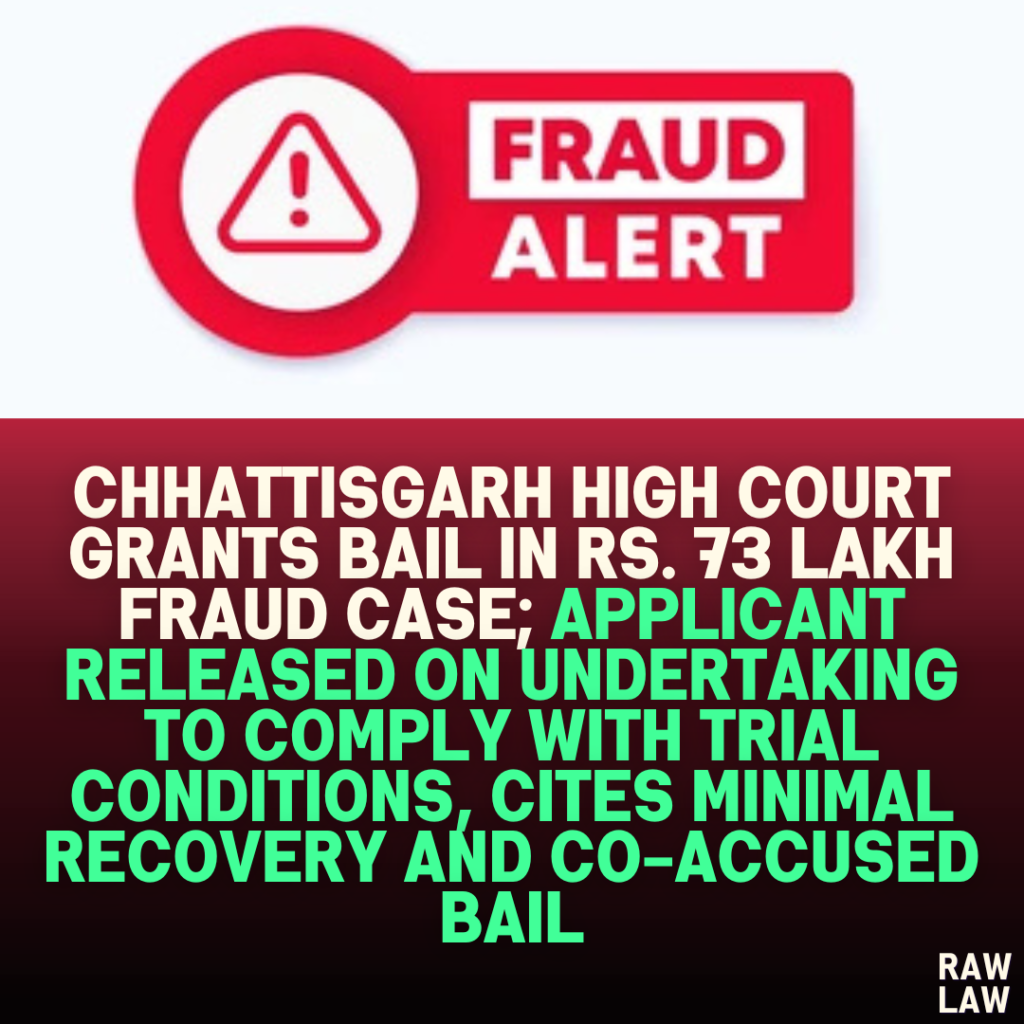Court’s Decision: The High Court of Chhattisgarh granted bail to the applicant, involved in a fraud case under sections 420, 409, 467, 468, 471, 120B, and 34 of the Indian Penal Code. The Court noted that the applicant, along with seven other accused, was involved in a fraudulent transaction resulting in a loss of Rs. 73 lakhs to the complainant. However, considering that one of the co-accused had already been granted bail and the trial might take time, the Court granted bail on strict conditions to ensure the applicant’s participation in the trial process.
Facts: The complainant had lodged a written complaint stating that he and several others sold a piece of land in Raipur to buyers for Rs. 1 crore 95 lakhs. However, the applicant and other co-accused executed two sale deeds for much lower amounts, fraudulently withholding Rs. 73 lakhs from the complainant. The applicant was accused of conspiracy and cheating in connection with this fraudulent transaction.
Issues: Whether the applicant is entitled to bail despite the serious nature of the fraud charges involving Rs. 73 lakhs.
Petitioner’s Arguments: The counsel for the applicant argued that the applicant was merely a land broker and had been falsely implicated in the case based on the memorandum statements of co-accused persons. He further argued that the applicant had not received any undue amount and had only Rs. 5,000 recovered from him, with no criminal antecedents. Given that the charge sheet had already been filed and the trial was expected to take time, the applicant requested bail.
Respondent’s Arguments: The State opposed the bail application, arguing that the applicant, along with the other accused, was involved in cheating the complainant. Although only Rs. 5,000 was recovered from the applicant, the State emphasized that the fraud amounted to Rs. 73 lakhs, making the applicant undeserving of bail.
Analysis of the Law: The Court considered Section 483 of the Bharatiya Nagarik Suraksha Sanhita (BNSS), 2023, in conjunction with the provisions of the Indian Penal Code under which the applicant was charged. The primary legal focus was on the implications of the applicant’s involvement in the conspiracy and fraudulent transaction, balanced against the length of time the trial might take and the lack of serious criminal antecedents.
Precedent Analysis: The Court referenced a previous decision where bail was granted to co-accused Usha Yadav on the grounds that she was a woman and the trial could be delayed. This precedent influenced the Court’s decision to grant bail to the applicant under strict conditions.
Court’s Reasoning: The Court, after evaluating the case diary and arguments, noted that the recovery from the applicant was minimal, and the charge sheet had already been filed. Furthermore, considering that one of the co-accused had already been granted bail, and the trial might take time, the Court found it appropriate to release the applicant on bail. However, the Court imposed several conditions to ensure the applicant’s attendance at the trial and to prevent any misuse of bail.
Conclusion: The Court granted bail to the applicant, requiring him to furnish a personal bond with two sureties, along with specific conditions to prevent delays in trial proceedings or misuse of bail. The applicant must attend all court hearings either personally or through counsel, and failure to comply with these conditions could lead to a revocation of bail.
Implications: This decision highlights the Court’s approach to balancing the seriousness of fraud charges with practical considerations such as the absence of previous criminal records, the amount of recovery from the accused, and the likelihood of a prolonged trial. The ruling sets a precedent for similar cases, emphasizing the importance of strict bail conditions to ensure judicial proceedings are not hindered.



